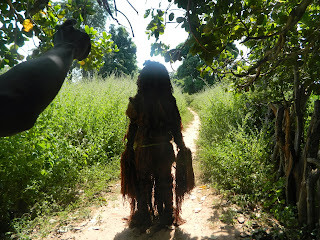 Back in December, I shamelessly solicited you all for money so I could build a school garden in my primary school. Thank you to those who donated. I'm overwhelmed by the amount of support I receive both emotionally and financially (for projects!) from all of you at home, so thank you all.
Back in December, I shamelessly solicited you all for money so I could build a school garden in my primary school. Thank you to those who donated. I'm overwhelmed by the amount of support I receive both emotionally and financially (for projects!) from all of you at home, so thank you all.The garden was constructed and planted by early February. Teachers, kids and community members alike are excited. I can't tell you how many times a day I'm asked how my garden is and how the plants are doing. "Jam tan," I tell them, "but it's YOUR garden!"
 On top of that, they also tell me when things aren't going well! Full disclosure, I've been insanely busy these past couple of months, ad only made it out to the garden a couple of times a week to check and see that everything wasn't dead. I'm also not a gardening expert, and while I've had some training and own a manual, there's a lot you can't learn from a book. So my neene told me the lettuce didn't look good, and sure enough, the sun was burning it all; I talked to the teachers in charge, Monsieur Kande, and we're getting some shade. Organization also needed to be readdressed- the kids are the ones taking care of the garden, but a lot of them don't know what they they don't always know what they're doing.
On top of that, they also tell me when things aren't going well! Full disclosure, I've been insanely busy these past couple of months, ad only made it out to the garden a couple of times a week to check and see that everything wasn't dead. I'm also not a gardening expert, and while I've had some training and own a manual, there's a lot you can't learn from a book. So my neene told me the lettuce didn't look good, and sure enough, the sun was burning it all; I talked to the teachers in charge, Monsieur Kande, and we're getting some shade. Organization also needed to be readdressed- the kids are the ones taking care of the garden, but a lot of them don't know what they they don't always know what they're doing. To remedy this, I brought in Sustainable Agriculture PCV Brad Berry, to the the kids a better idea of how to take care of a garden.With the help of Monsieur Kande, we used a question and answer format to discuss how to properly water beds, mulch, space plants, and maintain plant nurseries. For practice, we thinned the carrot nursery. Next time, inshallah, we're going to transplant the onion nursery and learn how to properly prepare a bed with all of the amendments.
To remedy this, I brought in Sustainable Agriculture PCV Brad Berry, to the the kids a better idea of how to take care of a garden.With the help of Monsieur Kande, we used a question and answer format to discuss how to properly water beds, mulch, space plants, and maintain plant nurseries. For practice, we thinned the carrot nursery. Next time, inshallah, we're going to transplant the onion nursery and learn how to properly prepare a bed with all of the amendments. I love this project because it covers several different areas. Aside from the physical benefits (VEGETABLES) and giving the children a project of their own (instead of making them do all of the work and reap none of the benefits), several volunteers and I are going to be doing regular classes on nutrition, gardening, and trees. I think it's really powerful when a bunch of adults give children this much attention, especially here. School is a lot of memorization, and these activities can give kids a reason to get excited to love school!
I love this project because it covers several different areas. Aside from the physical benefits (VEGETABLES) and giving the children a project of their own (instead of making them do all of the work and reap none of the benefits), several volunteers and I are going to be doing regular classes on nutrition, gardening, and trees. I think it's really powerful when a bunch of adults give children this much attention, especially here. School is a lot of memorization, and these activities can give kids a reason to get excited to love school! |
| Brad and me with our training group |


























